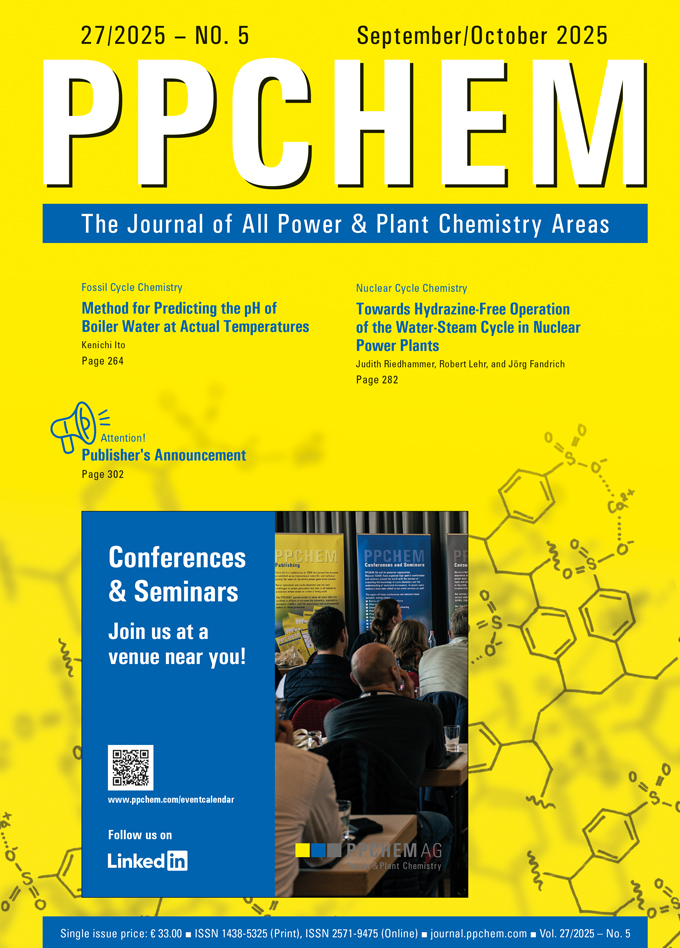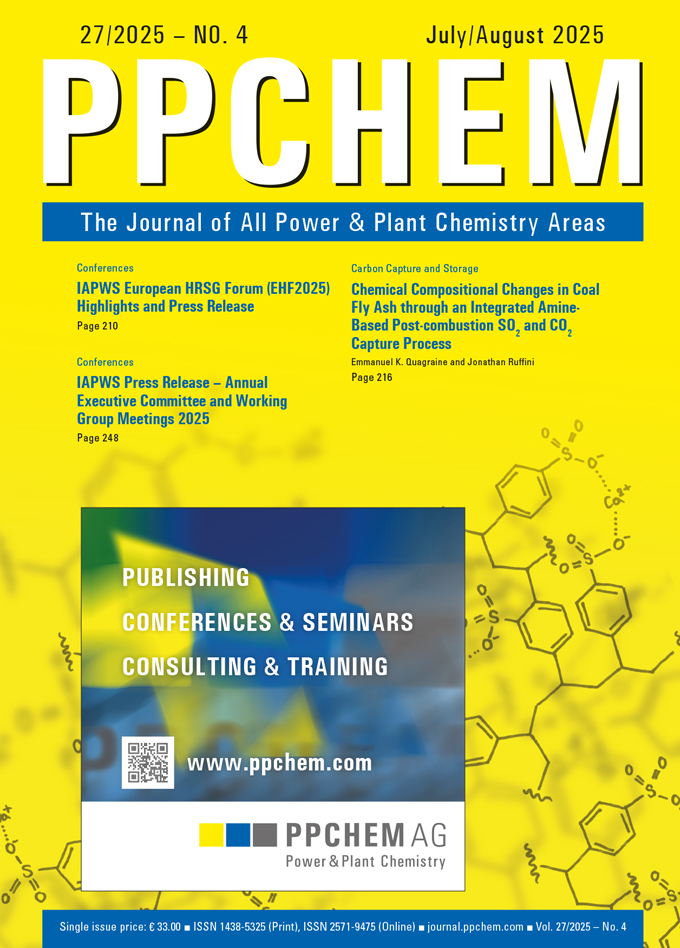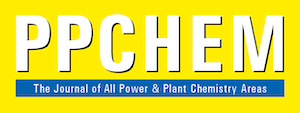Author: anderthalbAdmin
Issue 05 (2025)

For members only
ABSTRACTS
Method for Predicting the pH of Boiler Water at Actual Temperatures
Kenichi Ito
Normally, the pH of boiler water is controlled based on the pH at 25 °C. However, since the dissociation constants of water, acid components, and alkaline components vary with temperature, the pH behaviour at high temperatures differs significantly from that at 25 °C. The author developed a calculation program using the Microsoft Excel® macro function Visual Basic for Applications (VBA) to theoretically predict the pH of boiler water at actual temperatures (pHT).
As an application example of this program, the relationship between temperature and pHT for various alkalising agents as well as the relationship between the dosage of each alkalising agent and pH300°C were shown. The results indicated that ammonia and alkalising amines have lower alkalising capabilities at high temperatures compared to Na3PO4 and NaOH. Additionally, the example shows the relationship between the concentrations of acidic substances (HCl, acetic acid, formic acid, and orthosilicic acid) and pH300°C when using each alkalising agent.
PPCHEM® 2025, 27(5), 264–274
For Members only
Towards Hydrazine-Free Operation of the Water-Steam Cycle in Nuclear Power Plants
Judith Riedhammer, Robert Lehr, and Jörg Fandrich
Hydrazine is used in water-steam cycles of pressurized water reactors to protect the steam generators by generating reducing and oxygen-free conditions. However, growing regulatory and environmental concerns about its toxicity and mutagenic properties are leading to actions to restrict it or completely phase it out. Additionally, the declining availability of nuclear-grade hydrazine has led to supply shortages and disruptions in some cases.
To further ensure the material integrity of nuclear steam generators, this paper describes possible alternatives to hydrazine by leveraging the radiation field within nuclear steam generators. Theoretically, low-molecular-weight compounds comprising carbon, hydrogen, oxygen, and optionally nitrogen are capable of reacting with oxygen by undergoing a radiation-induced reaction. Experiments under steam generator conditions have confirmed methanol and ethanolamine as effective reductants, as they lower the redox potential and the corrosion potential of the most common nuclear steam generator tubing materials, as well as oxygen levels. Both chemicals have already been used in the nuclear industry.
PPCHEM® 2025, 27(5), 282–294
For Members only
Publisher’s Announcement
A New Chapter: The PPCHEM® Journal Goes Fully Digital in 2026
After more than two decades of continuous print publication, we would like to inform you that the PPCHEM® journal will discontinue its print edition at the end of 2025. The final printed issue will be Issue 6, scheduled for publication in December 2025. This decision reflects a broader shift in how our readership consumes content and the increasing demand for more flexible, accessible, and sustainable digital formats. While the printed journal will come to an end, PPCHEM® will continue to provide high-quality content through its online platform, maintaining our commitment to professional knowledge sharing.
PPCHEM® 2025, 27(5), 302
Article – Issues 05 (2025) – The PPCHEM Journal Goes Fully Digital
Download the Article’s PDF.
Article – Issues 05 (2025) – Towards Hydrazine-Free Operation of the Water-Stream Cycle in Nuclear Power Plants
E-Paper – Issue 05 (2025)
E-Paper – Issue 04 (2025)
Issue 04 (2025)

For members only
ABSTRACTS
IAPWS European HRSG Forum (EHF2025) Highlights and Press Release
The eleventh annual IAPWS European HRSG Forum was held on the 13th–15th May 2025 in Prato, Italy. It was chaired by Barry Dooley of Structural Integrity and Bob Anderson of Competitive Power Resources. EHF2025 attracted 95 participants from 20 countries and included 27 users.
EHF2025 was developed and continues to be supported by the International Association for the Properties of Water and Steam (IAPWS) and is held in association with the Australasian Boiler and HRSG Users Group (ABHUG) and the US HRSG Forum (HF). The EHF2025 event was organized by Mecca Concepts, Australia and had 17 sponsors: Precision Iceblast Corporation, NEM, Dekomte, Freudenberg Flow Technologies, TÜV Rheinland, New Componit, Advanced Valve Solutions, Tuff Tube Transition, TesTex, Quest Integrity, Metroscope, OMB, Pruss, Fuel Tech, Arnold Group, IMI and Thermic Systems.
PPCHEM® 2025, 27(4), 210–212
For Members only
Chemical Compositional Changes in Coal Fly Ash through an Integrated Amine- Based Post-combustion SO2 and CO2 Capture Process
Emmanuel K. Quagraine and Jonathan Ruffini
Combustion of coal in air leads to a gaseous product stream (flue gas) that mainly contains nitrogen (N2), carbon dioxide (CO2), water vapor, and small quantities of many other gases such as sulphur oxides (SO2 and SO3) and nitrogen oxides (NOx mainly, NO, and NO2) as well as particulates (mainly coal fly ash (CFA)) at different concentrations depending upon the content of the coal and the quantity of air used for its combustion. The need to maintain reliable power while reducing greenhouse gas emissions has been driving governments and companies worldwide toward CO2 capture and storage/utilization. One such initiative is SaskPower’s Integrated Carbon Capture and Storage (CCS) project at its Boundary Dam Unit 3 (BD3), which is amine based and just passed 10 years of commercial operation. The listed impurities in coal flue gas, of which CFA is the current focus, can cause degradation of the amines and have many other adverse effects on the capture process. Indeed, current electrostatic precipitators or fabric filters are designed to remove most of the CFA (typically up to ~ 99.9 % or 99.99 %, respectively), yet accumulation of the relatively small unremoved fraction within the CCS process is documented as causing physical barriers to the operation. One aspect of the effect of CFA on the amine-based CO2 capture system which is very poorly elucidated is its interactions with the gaseous acidic impurities in the flue gas and with added treatment chemicals as it traverses various sections of the process under different conditions such as pH and temperature, and how these can affect the overall performance of CCS systems. In this current paper we present the chemistry behind changes in the composition of CFA as it travels through the flue gas pretreatments and the integrated amine-based postcombustion SO2 and CO2 capture process at the BD3 CCS facility. Generally, through the various stages of treatment, CFA is modified in various ways including a) extensive depletion of water or acid leachable ions of metals like aluminium (Al), iron (Fe), magnesium (Mg), sodium (Na), and potassium (K) at the pre-scrubbing stage (pH ~ 2); b) co-deposition with CFA of sulphate and phosphate salts of Na, Fe, and barium (Ba) due to leaching of the respective ions from CFA (and from steel material corrosion in the case of Fe) at the flue gas cooling and the SO2 absorption stages, at high enough levels to exceed their saturation point or solubility products; and c) silicon dioxide or silica (SiO2) removal at certain sections within the CO2 capture stage due to its leaching from CFA under some high pH and temperature conditions.
PPCHEM® 2025, 27(4), 2016–240
For Members only
IAPWS Press Release – Annual Executive Committee and Working Group Meetings 2025
Between June 22nd and 27th, 96 scientists, engineers and 10 guests representing 20 countries met at the Hanaholmen Convention Centre in Helsinki, Finland for the annual meetings of the IAPWS Executive Committee and Working Groups. This series of meetings began in 1929 in London, UK with the purpose to connect scientists and researchers with the industry operators, engineers and managers who use their work. Collaboration and engagement across these varied groups provides guidance to the researchers on topical problems within industry and provides the engineers with the latest research results for direct application in their facilities.
IAPWS produces releases and guidelines on the recommended scientific formulations for physical and chemical properties of water in its various forms as well as technical guidance documents that are the concerted opinion of IAPWS members on the best operating practices for power plant chemistry. IAPWS also documents certified research needs that represent the opinion of experts in their respective fields that a research topic is greatly needed to fill a current gap in knowledge. All this information is freely available and can be found on the IAPWS website at www.iapws.org.
PPCHEM® 2025, 27(4), 248–250

